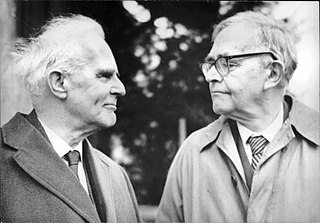A Quote by Simone Weil
We must love all facts, not for their consequences, but because in each fact God is there present.
Quote Topics
Related Quotes
This is what I mean when I say I would like to swim against the stream of time: I would like to erase the consequences of certain events and restore an initial condition. But every moment of my life brings with it an accumulation of new facts, and each of these new facts bring with it consequences; so the more I seek to return to the zero moment from which I set out, the further I move away from it. . . .
We can never put enough distance between ourselves and what we love. To think that God is, is still to think of him as present; this is a thought according to our measure, destined only to console us. It is much more fitting to think that God is not, just as we must love him purely enough that we could be indifferent to the fact that he should not be. It is for this reason that the atheist is closer to God than the believer.
To find God, you must look with all your heart. To remain present to God, you must remain present to your heart. To hear his voice, you must listen with all your heart. To love him, you must love with all your heart. You cannot be the person God meant you to be, and you cannot live the life he meant you to live, unless you live from the heart.
People think that they have no right to judge a fact - all they have to do is to accept it. Thus from the moment that technics, the State, or production, are facts, we must worship them as facts, and we must try to adapt ourselves to them. This is the very heart of modern religion, the religion of the established fact, the religion on which depend the lesser religions of the dollar, race, or the proletariat, which are only expressions of the great modern divinity, the Moloch of fact.
...marriage is foremost a vocation. Two people are called together to fulfill a mission that God has given them. Marriage is a spiritual reality. That is to say, a man and a woman come together for life, not just because they experience deep love for each other, but because they believe that God loves each of them with an infinite love and has called them to each other to be living witnesses of that love. To love is to embody God's infinite love in a faithful communion with another human being.
So long as we stand "under the Law", we cannot perceive this hidden unity of all the commandments. It is part of legalism that the will of God must appear to it as a multiplicity of commandments. In actual fact, it is one and indivisible; God wants nothing else except love because He Himself is love.
Forgiveness breaks the chain of causality because he who 'forgives' you--out of love--takes upon himself the consequences of what you have done. Forgiveness, therefore, always entails a sacrifice. The price you must pay for your own liberation through another's sacrifice is that you in turn must be willing to liberate in the same way, irrespective of the consequences to yourself.
Every person needs to feel significant. We want our lives to count. We yearn to believe that in some way we are important and that hunger for significance-a drive as intense as our need for oxygen-doesn't come from pride or ego. It comes from God because he wants each of us to understand how important we are. ... We must seek our roots, our origin, and our destiny so that we can know our present value. ..... ...We can help each other realize that we are persons of significance being made in the image of God.
There are two consequences in history; an immediate one, which is instantly recognized, and one in the distance, which is not at first perceived. These consequences often contradict each other; ... look to the end of an accomplished fact, and you will see that it has always produced the contrary of what was expected from it.
The past is of no importance. The present is of no importance. It is with the future that we have to deal. For the past is what man should not have been. The present is what man ought not to be. The future is what artists are.
The facts: nothing matters but the facts: worship of the facts leads to everything, to happiness first of all and then to wealth.









































